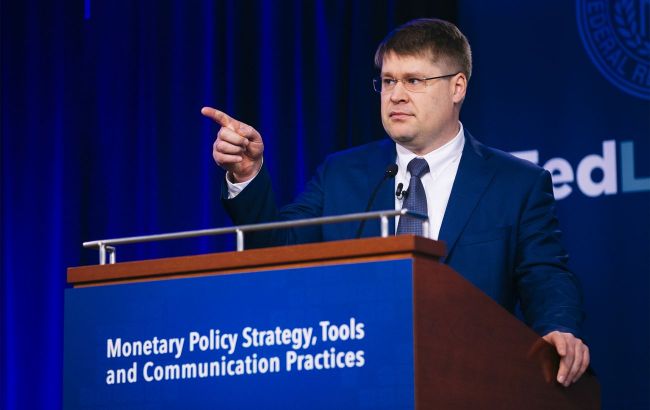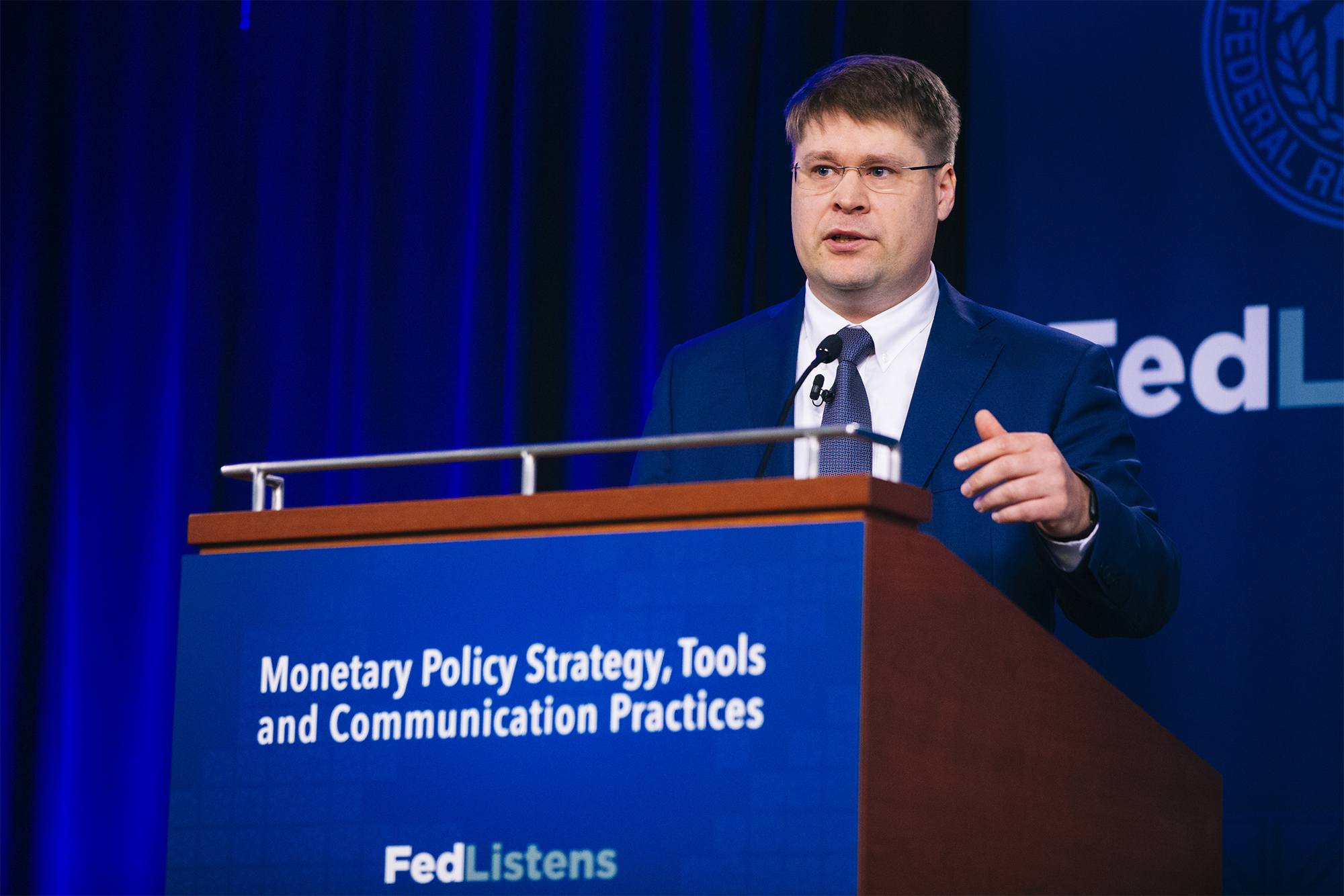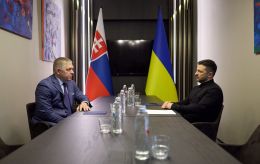Economist Yuriy Horodnichenko: No time to wait for Russian economy to collapse
 Yuriy Gorodnichenko, professor of economics at the University of California (Photo: Getty Images)
Yuriy Gorodnichenko, professor of economics at the University of California (Photo: Getty Images)
Yuriy Gorodnichenko, professor of economics at the University of California, Berkeley, and advisor to the governor of the National Bank of Ukraine,in an interview with RBC-Ukraine, speaks about economic policy during the war and post-war recovery, on the cost of macroeconomic stability and the exchange rate of the hryvnia, on the aggressor's economy, anti-Russian sanctions and Russian assets serving Ukraine, as well as on corruption and the conditions for victory in the great war.
At the end of June, the VIII Annual Research Conference of the Central Banks of Ukraine and Poland was held in Kyiv. The conference aimed to explore the peculiarities of central bank operations during times of major shocks and extraordinary uncertainty. Once again, one of the conference speakers was Yuriy Gorodnichenko, a member of the editorial boards of many publications, including the Journal of Monetary Economics and VoxUkraine.
Contents
- Economic policy during war
- Post-war recovery
- Cost of macroeconomic stability for Ukraine
- Situation on hryvnia exchange rate
- Russian economy and anti-Russian sanctions
- Russian assets serving Ukraine
- Anti-corruption
Economic policy during war
In April 2022, Professor Gorodnichenko, along with eight other world economists, developed recommendations for Ukraine's economic policy during the war. They wrote that Ukraine should prepare for a war of attrition. The Ukrainian economy faces a long marathon, and ultimately, it will need to rely on its own resources. Gradually, international assistance to Ukraine will decrease, raising the question of resource procurement.
Currently, the country has relaxed currency controls compared to the first months of the war, but scientists are not sure that this liberal regime will last long. Money always flees countries at war, so it will be necessary to return to strong capital movement restrictions at some point.
The reason for this could be the uncertain situation with the inflow of international financial aid.
Post-war recovery
Even before the development of economic policy recommendations, in April 2022, Yuriy Gorodnichenko led the preparation of the Ukraine Reconstruction Plan. Almost 2.5 years after the war began, the main principles laid out in the Plan have not changed. Public and private capital must be attracted to the country's reconstruction. Large-scale modernization of the country will require financial capital and legislative and institutional changes.
The potential reconstruction scales are much larger than could be imagined in April 2022. Additionally, the priorities of future reconstruction policy have shifted. The need for effective coordination of efforts among all potential participants is now at the forefront.
"Among the positive examples of economic policy is the agreement on the European Union's financial support program for Ukraine, Ukraine Facility. This is an example of moving in the right direction, allowing focus on necessary reforms," says the professor.
An important factor that will affect post-war recovery is the demographic crisis. Its scale was hard to imagine, even in 2022. How should Ukrainian refugees be returned? What should be done with the Pension Fund, which is essentially bankrupt? These and many other questions still need answers.
Cost of macroeconomic stability for Ukraine
Yuriy Gorodnichenko calls maintaining macroeconomic stability from the early days of the war a significant achievement for the Ukrainian authorities.
"If we can't control all processes but can stabilize inflation or the national currency exchange rate, that's very good," he assures.
Macroeconomic stability is not an end in itself, but it is an important building block on the path to Ukraine's victory in the war. It is important to understand that this stability is highly dependent on external assistance from partners.
Macroeconomic stability also has its price, in the literal sense. Recently, former National Bank head Valeria Gontareva harshly criticized the current work of the NBU. She mentioned that due to what she considers the mistaken currency and monetary policies of the NBU – too high a key rate and high rates on deposit certificates, as well as delays in liberalizing the hryvnia exchange rate – the state, represented by the NBU and the Ministry of Finance, overpaid banks a tremendous amount of money (around 200 billion UAH) amid a lack of incentives for lending and low deposit rates.
According to Yuriy Gorodnichenko, high rates in the Ukrainian economy are due to the significant level of inflation in the initial period of the war, which was a consequence of the significant emission of hryvnia by the central bank.
"If we want to have macroeconomic stability, monetary policy cannot be soft. To keep inflation from rising, a strict monetary policy is needed. This theoretically means that money will be expensive until the end of the war," he predicts in his interview with RBC-Ukraine.

Yuriy Gorodnichenko (Photo: Getty Images)
He believes it is unrealistic to expect the rate to drop to 7% or 5% shortly. Many countries have tried this, such as Turkey. As a result, the country faced rampant inflation. Obviously, Ukraine does not need such a situation.
It is also important to consider that Ukraine is currently cut off from external financial markets due to the war, making it difficult to assess the equilibrium interest rates in the economy. In the best times, Ukraine borrowed on international private capital markets at 7-10% annually in dollars. Therefore, the current NBU discount rate can hardly be considered very high.
Situation on hryvnia exchange rate
Professor Gorodnichenko has been a strong proponent of abandoning the fixed hryvnia exchange rate since the start of the full-scale war. The longer a fixed exchange rate is maintained, the more imbalances accumulate, potentially leading to a devaluation explosion. This has happened thrice in Ukraine – in 1998, 2008, and 2014, always ending in a financial crisis.
"My idea was to switch to a floating exchange rate, determined by market factors. From a position of strength. While we have reserves. Before imbalances accumulate. In principle, the National Bank did exactly that," the economist states.
Ukraine switched to a floating hryvnia exchange rate, avoiding financial, banking, and overall economic crises.
Russian economy and anti-Russian sanctions
At one point, US Senator John McCain called Russia a "gas station masquerading as a country." This implies that the most effective sanctions against Russia would target its energy sector. Oil dollars and gas dollars need to come to an end, Professor Gorodnichenko is convinced.
The main problem with the sanctions lies in their philosophy, which was built on the principle of gradually stifling the Russian economy. The hope was that through "a thousand cuts," the aggressor's economy would collapse.
"In principle, this will happen, but unfortunately, Ukraine doesn't have the time to wait for the Russian economy to collapse. The philosophy of sanctions needs to change—we should impose the maximum possible restrictions from the start, and then, if they prove effective, gradually 'loosen the screws,'" advises the scholar.
According to him, the most effective sanctions would be a total embargo on Russian energy carriers—similar to what was done for Iran or North Korea.
How can this be achieved? It requires the political will of Ukraine's partners.
Currently, Russia manages to find workarounds for each new batch of sanctions. This is the main problem with the effectiveness of Western restrictions. This was the case, for example, with the oil embargo.
"From my point of view, this was wrong. From the perspective of our Western partners, it made sense because it gave their businesses time to prepare for the new realities. I see only one path—constant pressure on our allies to demand new sanctions," advises Gorodnichenko.
Russian assets serving Ukraine
The scholar supports the idea of confiscating Russian assets worldwide for Ukraine's benefit. In one of his articles, he mentions that, besides the $300 billion of the Russian central bank, Russian assets abroad could amount to $1.1 trillion. This figure excludes the assets of the Russian central bank. According to international experts, this is the amount Russia holds in offshore accounts worldwide through its oligarchs.
What could be done with these funds, wonders the RBC-Ukraine interviewee? The same thing the US did during World War II: they conducted an inventory of foreign financial assets to understand who owned what. Later, the US froze and confiscated German and Japanese assets, and even the assets of countries under German occupation - France, Belgium, and the Netherlands. These assets were then confiscated and transferred to the victims of the Nazi and Japanese regimes.
"Something similar could be done with Russian money to eventually transfer it to Ukraine. These are private funds, which is the problem. But if it is understood that Russian oligarchs are essentially friends of Putin and just act as his 'wallets,' then this money should be transferred to Ukraine," the RBC-Ukraine interviewee reflects.
How realistic is it for Ukraine to obtain approximately $300 billion of immobilized Russian central bank assets? Gorodnichenko claims it is possible.
"There is a growing understanding that the costs of supporting Ukraine in the war are borne by taxpayers in the US and the EU. So, at some point, the question will arise: why should the populations of these countries bear the costs of this war? Why not take Russian money? There are many arguments against this, but none of them withstand serious scrutiny. At some point, maybe this year or next, there will be political will to take these Russian assets and somehow transfer them to Ukraine," the scholar asserts.
Anti-corruption
In his materials, Professor Gorodnichenko emphasizes the importance of overcoming corruption as a prerequisite for Ukraine's survival. He is convinced that Ukraine does not need to reinvent the wheel to defeat corruption.
"As for combating corruption, it's clear what needs to be done: transparency, accountability, equality before the law, and the inevitability of punishment. The main problem on this path is eradicating the culture of corruption that has developed in Ukraine over many years. This is very difficult to get rid of," the professor says.
However, there is a general understanding that corruption during wartime is very dangerous for the state. Moreover, if Ukraine is interested in moving towards Europe, this movement should serve as an external anchor, constantly keeping it in check.
Corruption cannot be completely eradicated, but it can be minimized. History has many positive examples. Ukraine is not the first to go down this path.

